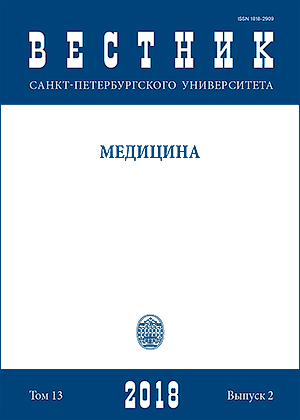The effect of high risk of a terrorist threat on the childbearing functions of women in the Republic of Dagestan
DOI:
https://doi.org/10.21638/11701/spbu11.2018.203Abstract
An analysis of the case histories and ambulatory cards of women in various regions of the Republic of Dagestan revealed that a significant weight contribution to the structure of gynecological diseases in areas subjected to illegal occupation by terrorist forces is caused by dysmenorrhea, premenstrual syndrome, and hyperprolactinemia syndrome. Women experienced psychological trauma in puberty metabolic disorders are manifested by increased glucose level and a decrease in high-density lipoproteins. Among the examined women who survived a high risk of a terrorist threat, changes in the concentrations of cortisol, prolactin and a decrease in luteinizing hormone, as well as estradiol, are significantly more common. Revealed that women exposed to mental trauma associated with a high risk of a terrorist threat in the pubertal period compared to women from areas power-assist attack, developed stress-induced immunity disorders manifested in a edecrease of the amount of b-cell populations of the immune system, an increase in the levels of IFN-α and TNF-α and decrease in IL-4 and IL-6. It is assumed that the key mechanisms for the formation of the pathology of the reproductive system are disorders of regulation of the endocrine and immune systems.
Keywords:
Terrorist threat, psychogenic disorders, vital stress, female infertility, violation of reproductive function
Downloads
References
References
Downloads
Published
How to Cite
Issue
Section
License
Articles of "Vestnik of Saint Petersburg University. Medicine" are open access distributed under the terms of the License Agreement with Saint Petersburg State University, which permits to the authors unrestricted distribution and self-archiving free of charge.




